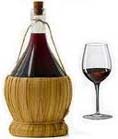Frequently Asked Questions 1
from Italian Traditional Food

Frequently asked questions ( FAQ ) page 1
for Italian Traditional Food
Welcome to the Italian Traditional Food frequently asked questions page 1. Listed below is a selection of
frequently asked questions raised by site visitors. Feel free to click on any question
of interest in order to obtain the answer. Also visit the Articles, Articles 2, Articles 3, Articles
4, Articles 5, Articles 6, Articles 7, Cookbooks, Cookbooks
2, Cookbooks 3, Glossary, Glossary 2, Glossary 3, Glossary A-E, Glossary F-N, Glossary O-Z, Links, About Me, Italian Pantry Ingredients, FAQ 2, FAQ 3, Oven Temperatures, Measurement
Converter, Cooking Tips, and Recipes
pages.
Page 1
Next
>>
Frequently Asked Questions:
-
Q: How can I stop apples from turning brown during
preparation?
-
A: There are two ways of preventing apples turning brown. You can
either peel them into salted water, in which case they should be rinsed before using but this
tends to remove the flavour, or preferably you can sprinkle them with lemon juice when sliced.
Lemon juice may also be used to prevent other fruit, eg. bananas and peaches, from
discolouring.
return to top
-
Q: How can I stop melted chocolate
from going dull and whitish when it dries?
-
A: Chocolate should be melted over very low heat and should not
be allowed to get more than lukewarm - otherwise it takes on a whitish tinge when it dries, and
loses its gloss. Putting it in the refrigerator to set will also make it dull.
To melt chocolate successfully, grate it or cut it into small
pieces and put it on a plate over a pan of warm water. When the chocolate starts to melt, work
it well with a palette knife. This will ensure that it stays glossy when it dries.
return to top
-
Q: What is "shortening"
exactly?
-
A: Shortening is a fat which, when worked into flour, gives a
"short" crisp quality to cakes and pastry. Fats with least liquid, such as lard, contain most
shortening power.
return to top
-
Q: How much garlic salt is
equivalent to one clove of garlic?
-
A: If you use a large pinch of garlic salt as a rough equivalent
of one clove of garlic, this should be sufficient to give the subtle flavour which is all that
is required. But, as with all flavourings, so much depends on individual taste.
return to top
-
Q: Which bouillon cube should I
use?
-
A: When a delicately flavoured stock is called for, eg. for veal,
chicken, rabbit and vegetable dishes, use chicken bouillon cubes. When a dish is full of
flavour and a rich brown colour, you should use beef cubes.
return to top
-
Q: Can I use dried herbs and in what
quantity?
-
A: Dried herbs can be used instead of fresh herbs. Use half the
quantity of dried herbs to the amount of fresh ones stated in the recipe. For example, a very
small pinch of dried thyme is equivalent to two sprigs of fresh.
return to top
-
Q: Why does peeling and chopping
onions make the eyes water?
-
A: It is the oil in the onion that causes the eyes to water. You
can stop it to a great extent by making sure that, when you peel the onion, you take out the
fine film of skin which lies between the onion skin and the onion flesh as this contains the
oil. Another tip is to peel onions under cold water.
return to top
-
Q: Does it make any difference to a
dish if a cheap wine is used?
-
A: Since the alchohol evaporates in cooking and only the taste of
the wine is left, it is advisable not to use a really cheap and unpalatable wine.
return to top
Page 1
Next
>>
|



 Digg
Digg Stumbleupon
Stumbleupon Google Bookmarks
Google Bookmarks Delicious
Delicious Twitter
Twitter Facebook
Facebook Yahoo My Web
Yahoo My Web Reddit
Reddit